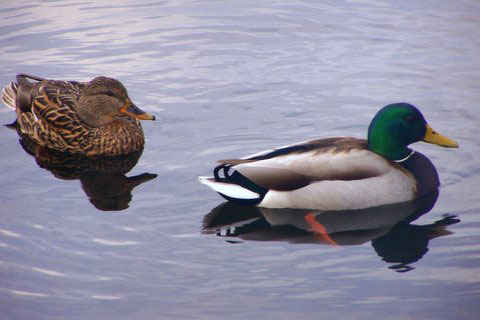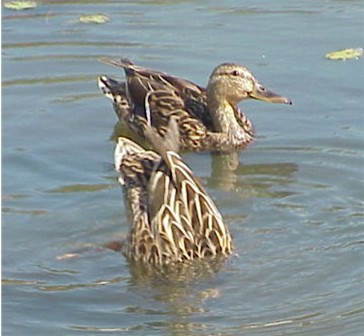The mallard lives in the Hudson River.


What is the most common duck in North America? A mallard! These waterfowl (birds that spend much of their time in the water) live in marshes, ponds, and rivers. Mallards have oil-producing glands on their bodies and they rub this liquid on their feathers to make them waterproof. Beneath the oiled feathers is a lining of down (small, fluffy feathers). These feathers keep the birds warm and dry. Also, the mallards trap air under their feathers and this helps them to stay afloat.
 A female mallard is called a hen, while a male mallard is called a drake.
You can easily tell the difference between the male and female ducks. Look at the picture.
The male mallard has a green-colored head and dark feathers.
The female mallard has a brown and white head and feathers.
A female mallard is called a hen, while a male mallard is called a drake.
You can easily tell the difference between the male and female ducks. Look at the picture.
The male mallard has a green-colored head and dark feathers.
The female mallard has a brown and white head and feathers.
 Mallards are characterized as "dabbling ducks" because they eat things at the surface of the water.
These ducks are omnivores (animals that eat both plants and other animals).
Their diet includes seeds and leaves, in addition to worms, insects, small fish, and fish eggs. Mallards use
their bills to pick up the food. They often dip their heads underwater as their bottoms remain above the surface.
Mallards are characterized as "dabbling ducks" because they eat things at the surface of the water.
These ducks are omnivores (animals that eat both plants and other animals).
Their diet includes seeds and leaves, in addition to worms, insects, small fish, and fish eggs. Mallards use
their bills to pick up the food. They often dip their heads underwater as their bottoms remain above the surface.
Although mallards love the water, you may also see them resting on a riverbank.
On land, a mallard's form of locomotion is waddling. They don't walk well because
they have webbed feet and their legs are not in the center of their bodies.
However, these webbed feet act like paddles and they allow the mallards to glide through the water.
Mallards fly south for the winter because ice and snow covers their northern habitat.
Why are mallards called "dabbling" ducks?
 |
Animal |
 |